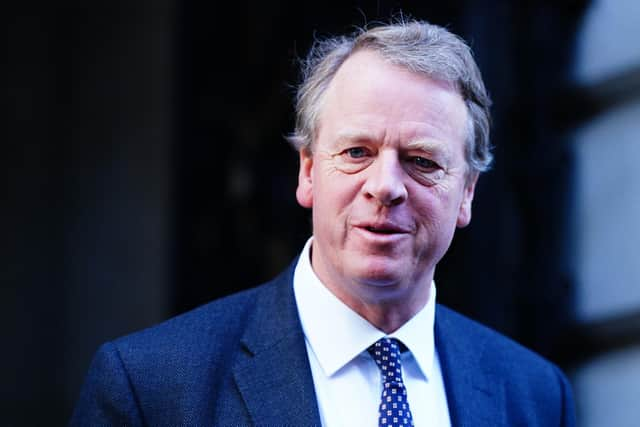Scottish independence: Alister Jack reveals role of civil servants in Scotland being looked at after Supreme Court indyref2 verdict
Figures published last week in the wake of the Supreme Court verdict on a second independence referendum revealed more than £1.5 million of public money will be spent annually on civil servants tasked with working on the independence campaign.
Scottish Secretary Alister Jack has confirmed what civil servants can and cannot do is being subsequently reassessed by the UK Government.
Advertisement
Hide AdAdvertisement
Hide AdIt comes as the Scottish Conservatives wrote to Permanent Secretary John-Paul Marks to ask him to seek “ministerial direction” over the lawfulness of any continued expenditure on referendum planning.


Mr Jack told the Scottish Affairs committee in Westminster that Cabinet Secretary Simon Case and senior civil servants, including Sue Gray, were discussing the issue with Mr Paul Marks.
It comes after the UK’s highest court ruled Holyrood does not have the power to legislate for a second independence referendum without Westminster’s consent.
The Supreme Court’s ruling was a significant blow to Nicola Sturgeon, who had set out plans to hold a second vote on independence on October 19 next year.
Mr Jack said: “The Permanent Secretary to the Scottish Government stays in close contact with Simon Case, Sue Gray, the proprietary and ethics team of the Cabinet Office on the role of the civil service in Scotland and what the parameters are that they can operate under and that has been the case certainly since 2014 when I think there was a review following the referendum.
“Following this judgement, they're working again on what that means for the role of the civil service in Scotland, so we'll have to see where that takes us.”
Scottish Tories leader Douglas Ross claimed that was a “crucial point” because it was a “party political issue, not a government issue”.
He said: “I think people in Scotland would be rightly concerned that they're continues to be hundreds of thousands of pounds, indeed millions of pounds, annually spent by civil servants at the direction of the First Minister in the Scottish Government on what is now a party election issue, because the First Minister wants to make this on a single issue election at the next general election.”
Advertisement
Hide AdAdvertisement
Hide AdAt the same committee, Mr Jack revealed the UK Government had spent “around £71,800” on legal fees for the Supreme Court case.
The Dumfries and Galloway MP was also challenged by the committee chair, SNP MP Pete Wishart, on whether Scotland “could secure an independence referendum and become an independent nation”.
Answering “of course”, Mr Jack explained it would require a “sustained majority”. He said: “There could be another referendum in Scotland, the union is voluntary, and that is evidenced by the fact that there was a referendum in 2014.
"Back then there was consensus between the two governments in Scotland, between pretty much all the political parties and across civic society. Could that sustained majority be achieved again? Yes, it could be.”
Challenged on whether polls could make a difference, Mr Jack said: “Well it is the duck test. If it sounds like a duck and waddles like a duck, then it’s probably a duck,
“People know when they’ve reached that point, and they knew back then they’d reached it, but we don’t believe we’ve reached that point. The majority of Scots do not want us to have a referendum. They want us to focus on the recovery after Covid.”
Mr Jack was also critical of plans announced by the First Minister that would see the SNP fight the next general election as a “de-facto” referendum.
He said: “You can’t have a mandate for something you don’t legally have power for. The Scottish Government can no more – although they put it in every manifesto that they want to remove Trident from Faslane – they no more have the power to take away our nuclear deterrent than they do to break up the United Kingdom and that is very clear and the justices agree with me on that.
Advertisement
Hide AdAdvertisement
Hide Ad“Less than a third of Scots want to have a referendum at the moment. We don’t see that there’s any great desire for one.”
Malcom Offord, a Tory peer and parliamentary under-secretary in the Scotland Office, also insisted the union remained "voluntary".
He said: "We're in a voluntary union since 1707 between two equal nations, negotiated on commercial terms, not at the point of a gun, which means either of us can leave at any time.
"The reason neither of us [have] in 315 years is it has been the most successful union, economically and politically."
The evidence has coincided with a business group seeking to take legal action against the Scottish Government over its spending of public money on the case for independence.
Scottish Business UK, which describes itself as an independent, non-party voice for business leaders who support the Union, accused Ms Sturgeon and SNP ministers of “behaving like a South American banana republic”.
It came as the Deputy First Minister John Swinney claimed Scotland should have more control over money for “levelling up”.
Appearing before the levelling up, housing and communities committee, Mr Swinney said: “I would be happier if the UK Government had taken the decision to essentially devolve the levelling up agenda to the Scottish Parliament and for us to take those decisions in partnership with organisations in Scotland so we were doing that on an aligned basis in Scotland.
“I think we would probably have better outcomes if we were able to take those decisions in the Scottish Government”.
The Scottish Government has been approached for comment.
Comments
Want to join the conversation? Please or to comment on this article.
